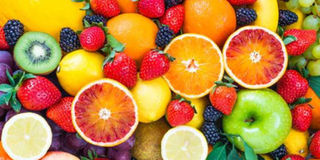Do fruits contain excess sugar?

Many people are advising against eating a lot of fruit because it is high in sugar. Is this true? – Michelle
Hello Michelle,
The reason many people are advocating for eating fewer fruits is that fruits generally are rich in a type of sugar called fructose. Fructose is what we call a simple sugar and is the same type found in the sugar crystals or table sugar we use in our tea and other foodstuffs.
Because table sugar has been linked to so many health problems, many people believe that eating fruit will have similar effects because fruit too is rich in fructose.
But this isn’t necessarily true. There is a difference between fructose in table sugar and in fruit. Whole fruit also has a lot of fibre which is entirely absent in table sugar.
Fibre is found in the peel, cover and the pulp of the fruit. Fibre plays a vital role in regulating the rate at which food is digested, and sugar from the fruit enters the blood. The fructose in fruit, because of the fibre, enters the blood rather slowly and in a well-regulated manner and so does not cause sugar spikes in the blood as seen with table sugar.
So, fruit when eaten whole, with the peel, skin or pulp, won’t have the same effect as table sugar, even if they both contain fructose. However, fruit juice, mainly when it has been sieved, when the pulp and skin are removed and when table sugar is added can produce sugar spikes that can be bad for you because of removal of the fibre.
Eating whole fruit is therefore acceptable while drinking fruit juice with sugar and juice that has been sieved or refined should be avoided. Nonetheless, please note that people who have problems with blood sugar, such as those with diabetes should always keep their fruit consumption to a minimum and when they do consume fruits, should aim to eat those with less sugar content and ensure they eat them whole, not as juice.
Send your question to [email protected] or via twitter
@drpaulkasenene.




